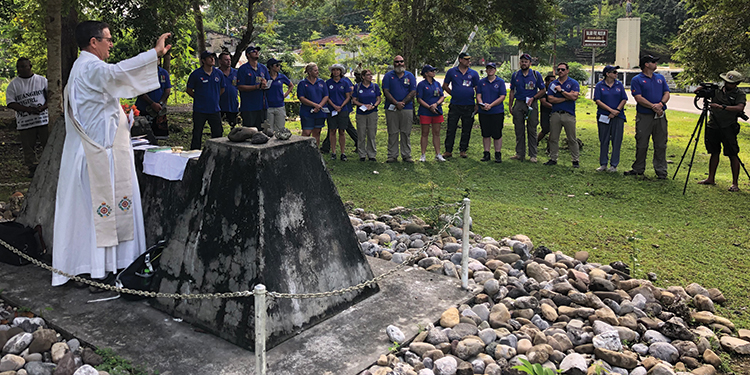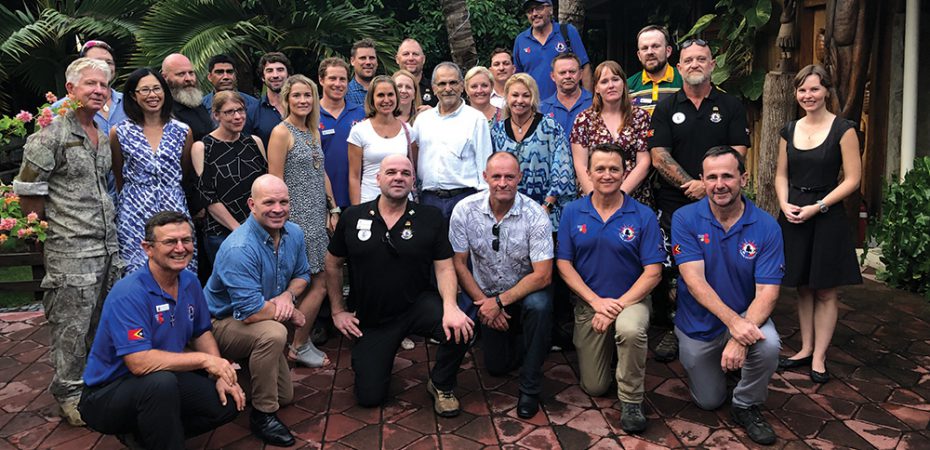Exploring the Diaconate ‘Down Under’
Bringing hope as a deacon-missionary
Deacon Gary Stone Comments Off on Exploring the Diaconate ‘Down Under’
Dear brothers in the universal Church, it’s great to be getting a copy of The Deacon and hear more of how others serve in the diaconate, and how others’ understanding of Christ the Servant is expressed in that ministry. I was delighted to be able to attend the USA National Deacons conference in Baltimore in 2004.
I am 67 years into the missionary journey upon which God has been leading me. For the last six years, I have been leading a large team of military veterans on a mission to raise the health and well-being of veterans and their families through holistic health education and pastoral care.
This has been an extraordinarily rich journey that God has blessed me in so many ways. Prior to that, I had 24 years in uniform as an army and police chaplain that led to many extraordinary experiences where I was able to bring hope to troubled people in many overseas conflicts as well as the soldiers and police officers that were busy in a mission of peacemaking. I also served 24 years as an infantry officer in the Army where I was a frontline peacemaker while at the same time a Christian witness to those with whom I worked.
Ordination as a Deacon
 My ordination as a deacon to the Catholic Church on Dec. 9, 1994, certainly took my mission and ministry as a Christian to another level but was, in a sense, a continuation of the work that God had been doing in me for many years. With ordination came a quite intentional ordering of my life into the leadership of ministry and mission within the framework of the Catholic Church. It was empowering and a great blessing for my future life, building on the knowledge, skills, attitudes and experiences that had developed in my earlier life.
My ordination as a deacon to the Catholic Church on Dec. 9, 1994, certainly took my mission and ministry as a Christian to another level but was, in a sense, a continuation of the work that God had been doing in me for many years. With ordination came a quite intentional ordering of my life into the leadership of ministry and mission within the framework of the Catholic Church. It was empowering and a great blessing for my future life, building on the knowledge, skills, attitudes and experiences that had developed in my earlier life.
In one sense, the discernment process for me was quite simple. The military was chronically short of chaplains, and a military chaplain, Padre John Tinkler, had asked me if I would consider entering into a diaconate program that our military diocese was commencing. He observed that I was already involved in a variety of ministries, God has been preparing me for this and it was a natural progression of work already in progress.
I am mindful that the Archdiocese for the Military Services, USA, does not yet utilize deacons as uniformed chaplains. But in Australia, this has been most successful with the majority of our army chaplains being deacons called from within the service.
Responding to Needs
My ministry since ordination has followed a similar pattern. Particular community needs emerged, and I responded to address them. I served as an army chaplain in many units and theaters.
At the same time, I saw a need for leadership in humanitarian work in Timor-Leste after seeing the total destruction inflicted by the Indonesian military. We raised a charity, Friends and Partners with East Timor, and delivered $1.5 million in human and material assistance. The Australian Federal Police approached me to provide ministry to their officers for an expansion of roles they were undertaking overseas.
………………………………………………………………………………………………………………………………………………………………………
Deacons in the Military
Deacon Gary Stone says he is mindful that the Archdiocese for the Military Services, USA, does not yet utilize deacons as uniformed chaplains. But in Australia, this has been most successful with the majority of our army chaplains being deacons called from within the service.
………………………………………………………………………………………………………………………………………………………………………
After 48 years in uniform, my own battle with cancer and having done many funerals for veterans in their early years, I realized that a new mission to support ex-service police and military was needed. I now lead a team of pastoral “carers” to address those needs in ministry, which is called Veterans Care.
Of course, this pattern is clearly evident in the early life of the Church where needs were met by setting apart and commissioning more missionaries for God’s mission field.
God’s Mission
Today, I very much see the discernment of God’s mission to the broader society as the necessary foundation and objective for anyone considering any vocation to the diaconate.
People enter holy orders not for the sake of getting a job or even a new identity, but because God‘s mission requires missionaries. There are many more needs out there today than we have missionaries.
At the same time, a vocation as a deacon is a call to leadership in mission. Every mission will require a diverse range of people, suitably led, to enable the mission to be completed. We don’t need “lone rangers.” We need leaders in mission, operating under the authority and supervision of the Church, who empower the laity and train and develop lay leaders and lay ministers.

Pope Francis regularly calls for the Church to become missionary disciples. Deacons exercise a particular role in that area, as a bridge between the world and the Church. They invariably need to be of mature age, life-experienced men who can exercise leadership in achieving the missions that God has for us.
Most missional ministries involve us going out beyond the comfort of the Church into the margins of society where the Church has had a limited presence. That doesn’t have to be overseas — there are many marginalized needy people and groups all around us who need to experience our faith, hope and love for them.
The harvest is plenty but the laborers, at the moment, seem to be few. I pray that the Lord will call and send more men into the mission fields of the world as deacons.
DEACON GARY STONE, known as The Veterans Padre, provides spiritual ministry to the Australian Defence Force and veterans on the Gold Coast of Australia.
………………………………………………………………………………………………………………………………………………………………….
Ministry of the Deacon
“The priest is primarily called to the service of worship and sanctification through the administration of the sacraments and the proclamation of the Word. His service of charity in the world, and especially walking with his people in their pilgrimage through life, is an extension and a validation of his service in the sanctuary.
“The deacon, on the other hand, though truly an ordained minister, is primarily called to the service of charity in the world. His ministry in the sanctuary is an extension of his service to the world. He has a quite distinct and specific role in the Church which is not to be confused with that of the priest. The priest and the deacon represent two different poles, so to speak.”
— Australian Cardinal Edward Bede Clancy (1923-2014), former archbishop of Sydney
……………………………………………………………………………………………………………………………………………………………………





